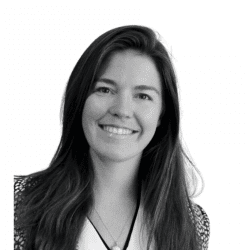
Nikki Gravning
Nikki Gravning is Director of Strategic Partnerships, Ashoka Europe with a core focus on partnerships to embed radical collaboration and changemaking for a better world into the corporate landscape.
Before joining Ashoka, Nikki successfully led the Social Innovation Strategy for New Zealand’s National Innovation Agency to change the funding landscape for social entrepreneurs in the country. She has mentored social enterprises in accelerator programs and helped raise $2 million for New Zealand’s largest social enterprise in 2017. She is a World Economic Forum Global Shaper Alumni and a Centre for Sustainability Leadership Fellow from her days in Sydney, Australia.
The Case For Changemaker Education

Building an Everyone a Changemaker world means we both embrace our changemaking potential and enable those in our homes, schools, workplaces, and communities to do the same. This level of engagement is essential to ensure that shared challenges in a rapidly changing world — some of them existential — are met. New realities in the 21st century require us to adapt fluidly. Ashoka UK & Ireland is building a movement of leading social entrepreneurs, partners, civic leaders, communities and schools to celebrate changemaking by and for the good of all.
One of our strategic aims is to inspire changemaking behaviours from the early years to ensure that young people grow up to be empathetic, creative and community-oriented leaders — no matter the career path they choose to follow. That’s why our new partnership with The Edge Foundation is so exciting. Its mission is to make education relevant to life and work in the twenty-first century. Edge has been working for years to support a broader curriculum in schools — one that activates learner agency, the same agency that underpins our work towards an Everyone a Changemaker world. At the heart of that work is commitment to empowering all young people to be changemakers.
This past May, Edge ran a YouGov poll to gauge UK demand for changemaking as a core component of education. The results were overwhelmingly in favour.
71% of UK parents want education to enable their children to become changemakers.
80% of teachers want the same.
When asked whether they want to help pupils develop values like kindness, empathy and community cohesion — core changemaker skills — the proportion of teachers in favour rose to 96%. Meanwhile, in a separate poll from August 2020, almost two-thirds (65%) of 14–19-year-olds agreed that they wanted education to enable them to take action, activate others to address problems, and find solutions that benefit all.
Survey results are clear: the demand for changemaker education is strong. And changemaking is applicable across the educational spectrum, from early years to higher education. This isn’t merely theoretical. A growing number of institutions worldwide are responding to the demand from young people for the skills that will help them contribute to a better future.
In 2013, University of Northampton in the East Midlands adopted a changemaking strategy and became an Ashoka U Changemaker Campus. The university had a long culture of embracing social issues, but following increased commercialisation of higher education, they had to evolve. They needed to stay relevant while meeting government measures of success. In Northampton’s case, graduate employability, a key performance indicator, was central to their strategy.
Northampton began with a new skills framework in line with what YouGov poll respondents want to prioritise. They sought input from faculty, administration staff, students, regional employers and local schools. This allowed them to identify core changemaking behaviours relevant to all these groups. Behaviours they identified included critical thinking, perspective-shifting, problem-solving, social betterment, employability, and personal transformation. With bottom-up input from the student body and faculty, as well as the governing board, the framework was more readily adopted. To encourage uptake, Northampton also introduced incentives, such as a new ‘Employability Award’.
Most importantly though, Northampton took the bold decision to roll their strategy out university-wide from the start — a brave big bang approach. Changemaking immediately became a campus priority. A ‘changemaker champion’ on the governing board also acted as a bridge between strategic decision-making and practical implementation on the ground.
Given the YouGov poll findings, the time is right for us to find and showcase other examples of changemaker education across the UK and Ireland. Because we know that the benefits of changemaker education are evident everywhere. From mental health apps to improved access to menstrual hygiene, measures for tackling e-waste and even making old cars more environmentally friendly, innovations that protect the environment and make people’s lives better are increasingly driven by young people who have claimed their agency.
Young changemakers in action.
We think history will look back on changemaking as the new literacy of the 21st century. We need a movement that celebrates everyone’s ability to solve shared problems in creative, impactful and empowering ways, and that ensures the skills necessary to do that are central to what schools teach and measure. That will help us to realise our Everyone a Changemaker vision.
At the Ashoka Changemaker Summit on 17 November 2020, we’ll run a joint session with Edge, entitled The Case for Changemaker Education.
We’ll bring together experts (including from the University of Northampton) to learn more about their approach to changemaking education.
Find out more and book your place at https://acms.ashoka.org/.